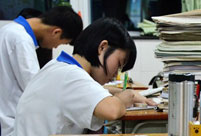 Luoyang aims to become 'Chinese Culture City'
Luoyang aims to become 'Chinese Culture City'
 Century-old jade disc found confirms ancient legend
Century-old jade disc found confirms ancient legend
 A serious mind behind Chinese leader
A serious mind behind Chinese leader
 Panda Cubs to Predict 2014 World Cup Winners
Panda Cubs to Predict 2014 World Cup Winners
 China Southern Airlines flight attendants win titles in service contest
China Southern Airlines flight attendants win titles in service contest
 Pupil's performance art persuades people to stop smoking
Pupil's performance art persuades people to stop smoking
 Nie Chenxi's clay tigers
Nie Chenxi's clay tigers
 Children's Day wishes
Children's Day wishes
 Chinese Kung Fu charms Silicon Valley
Chinese Kung Fu charms Silicon Valley
 Tranquil Yankou ancient town
Tranquil Yankou ancient town
China has submitted applications to UNESCO to preserve the archives that confirm the suffering of "comfort women", in order to make them part of the Memory of the World Register.
“By applying for the inclusion of precious historical documents related to the Nanjing Massacre and Japan's forced recruitment of the ‘comfort women’ in the register, China intends to commemorate history, treasure peace, uphold the dignity of mankind, and prevent such offences against humanity, human rights, and human beings from ever happening again.”
Foreign Ministry spokeswoman Hua Chunying confirmed the news at a regular press conference on Tuesday.
When asked whether the Chinese government has applied for the inclusion of relevant files and documents, Hua said that Memory of the World Register is an important initiative launched by United Nations Educational, Scientific and Cultural Organization (UNESCO) which collects manuscripts and rare documents preserved in libraries and archives as well as oral historical records of worldwide significance.
China has been active in making applications to the Memory of the World Register and currently has nine documents listed on the register. What has been submitted on this occasion is a series of authentic, rare and precious documents with historical significance, which meet the standard of application.
The application follows recent comments by leading Japanese politicians and academics casting doubt on the plight of the comfort women.
The Japanese Imperial Army had a policy of forcing women captured in occupied lands to work as sex slaves in military brothels.
What is Memory of the World Register?
UNESCO's Memory of the World Programme is an international initiative launched to safeguard the documentary heritage of humanity against collective amnesia, neglect, the ravages of time and climatic conditions, and willful and deliberate destruction.
It calls for the preservation of valuable archival holdings, library collections and private individual compendia from all over the world for posterity, for the reconstitution of dispersed or displaced documentary heritage, and for increased access to and dissemination of these items.
This documentary heritage serves as a mirror, reflecting the diversity of language, ethnic groups and culture, and also the memory of the world.
However, much documentary heritage is fragile, and we are losing memories every day. UNESCO has therefore launched the program as a way to preserve and promote documentary heritage, which can be a single document, a collection, a holding, or an archive that is deemed to be of such significance as to transcend the boundaries of time and culture.
As of June 2013, there were 299 items of international significance from 100 countries included in "Memory of the World”. China has nine documents listed on the register. They are:
Ancient Naxi Dongba Literary Manuscripts
Documentary heritage submitted by China and recommended for inclusion in the Memory of the World Register in 2003.
Ben Cao Gang Mu ( Compendium of Materia Medica)
Documentary heritage submitted by China and recommended for inclusion in the Memory of the World Register in 2011.
Golden Lists of the Qing Dynasty Imperial Examination
Documentary heritage submitted by China and recommended for inclusion in the Memory of the World Register in 2005.
Huang Di Nei Jing (Yellow Emperor’s Inner Canon)
Documentary heritage submitted by China and recommended for inclusion in the Memory of the World Register in 2011.
Official Records of Tibet from Yuan Dynasty China, 1304-1367
Documentary heritage submitted by China and recommended for inclusion in the Memory of the World Register in 2013.
Qiaopi and Yinxin Correspondence and Remittance Documents from Overseas Chinese
Documentary heritage submitted by China and recommended for inclusion in the Memory of the World Register in 2013.
Qing Dynasty Yangshi Lei Archives
Documentary heritage submitted by China and recommended for inclusion in the Memory of the World Register in 2007.
Records of the Qing's Grand Secretariat - 'Infiltration of Western Culture in China'
Documentary heritage submitted by China and recommended for inclusion in the Memory of the World Register in 1999.
Traditional Music Sound Archives
Documentary heritage submitted by China and recommended for inclusion in the Memory of the World Register in 1997.
 Can't take eyes off national teams in World Cup
Can't take eyes off national teams in World Cup Graduation photos bring memories back to life
Graduation photos bring memories back to life Art school students present works in Nanjing
Art school students present works in Nanjing Xinjiang's first high-speed railway goes on trial run
Xinjiang's first high-speed railway goes on trial run 3D Sea-life Themed Art Garage unveiled in Zhengzhou
3D Sea-life Themed Art Garage unveiled in Zhengzhou
 Creative Photos go viral during graduation season
Creative Photos go viral during graduation season Students in last-minute effort for Gaokao
Students in last-minute effort for Gaokao Opening ceremony of 67th Cannes Film Festival
Opening ceremony of 67th Cannes Film Festival Pulse of Xiamen - Int'l Yoga art festival in May
Pulse of Xiamen - Int'l Yoga art festival in May Top 20 hottest women in the world in 2014
Top 20 hottest women in the world in 2014  Dali, an ideal summer vacation destination
Dali, an ideal summer vacation destination Xichan Temple's little monk hit the Internet
Xichan Temple's little monk hit the Internet Monologue of a modern dancer
Monologue of a modern dancer College girl proposes to boyfriend on Weibo
College girl proposes to boyfriend on Weibo Special operation members in counter-terrorism training
Special operation members in counter-terrorism trainingDay|Week|Month